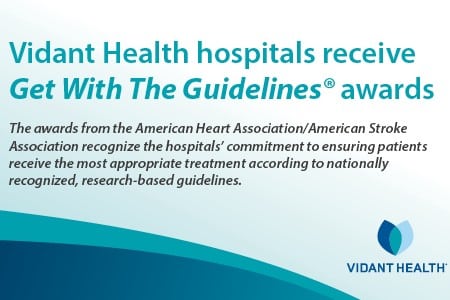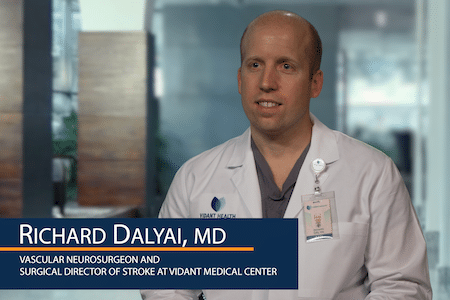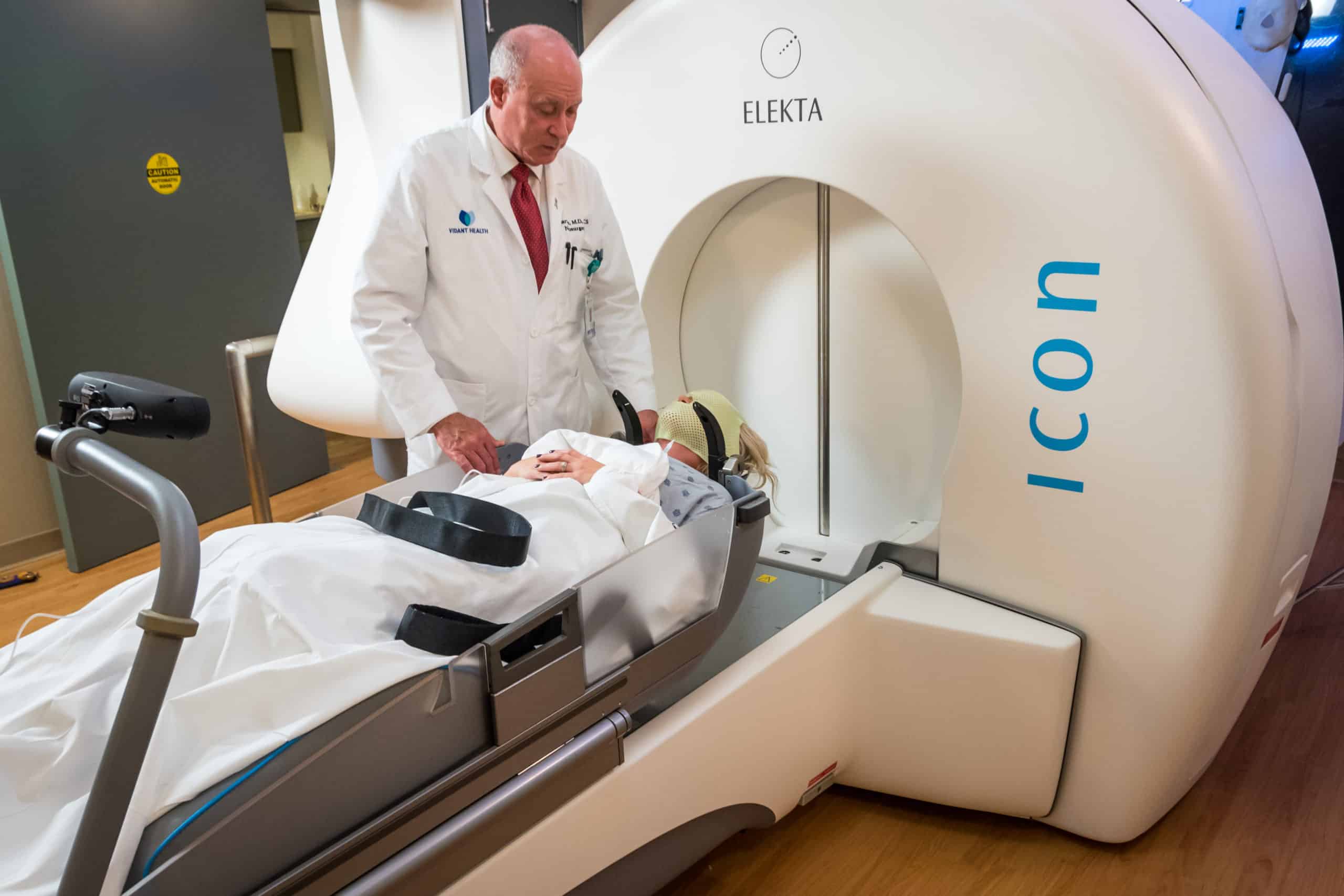Younger people are increasingly suffering from strokes according to medical experts at ECU Heath. While risk of stroke increases with age, health care teams have seen an increase in strokes in young people, partly due to a combination of COVID-19, an increase in consuming processed, sugary and fatty foods as well as smoking and vaping.
“With COVID-19, we have noticed an increase in strokes, especially in younger populations,” said Dr. Shailesh Male, stroke medical director, ECU Health Medical Center. “During the peak of the pandemic, my colleagues and I noticed that young patients who do not have vascular risk factors were having strokes. COVID-19, like other infections, increases the risk of forming blood clots and, in turn, can lead to higher risk of strokes.”
Strokes are considered the heart attack of the brain. A stroke occurs when a blood clot compromises blood flow to the brain. This leads to loss of brain function, manifesting in symptoms including: weakness or numbness on one side of your body, slurred speech or difficulty understanding others, blindness in one or both eyes, dizziness and/or a severe headache.
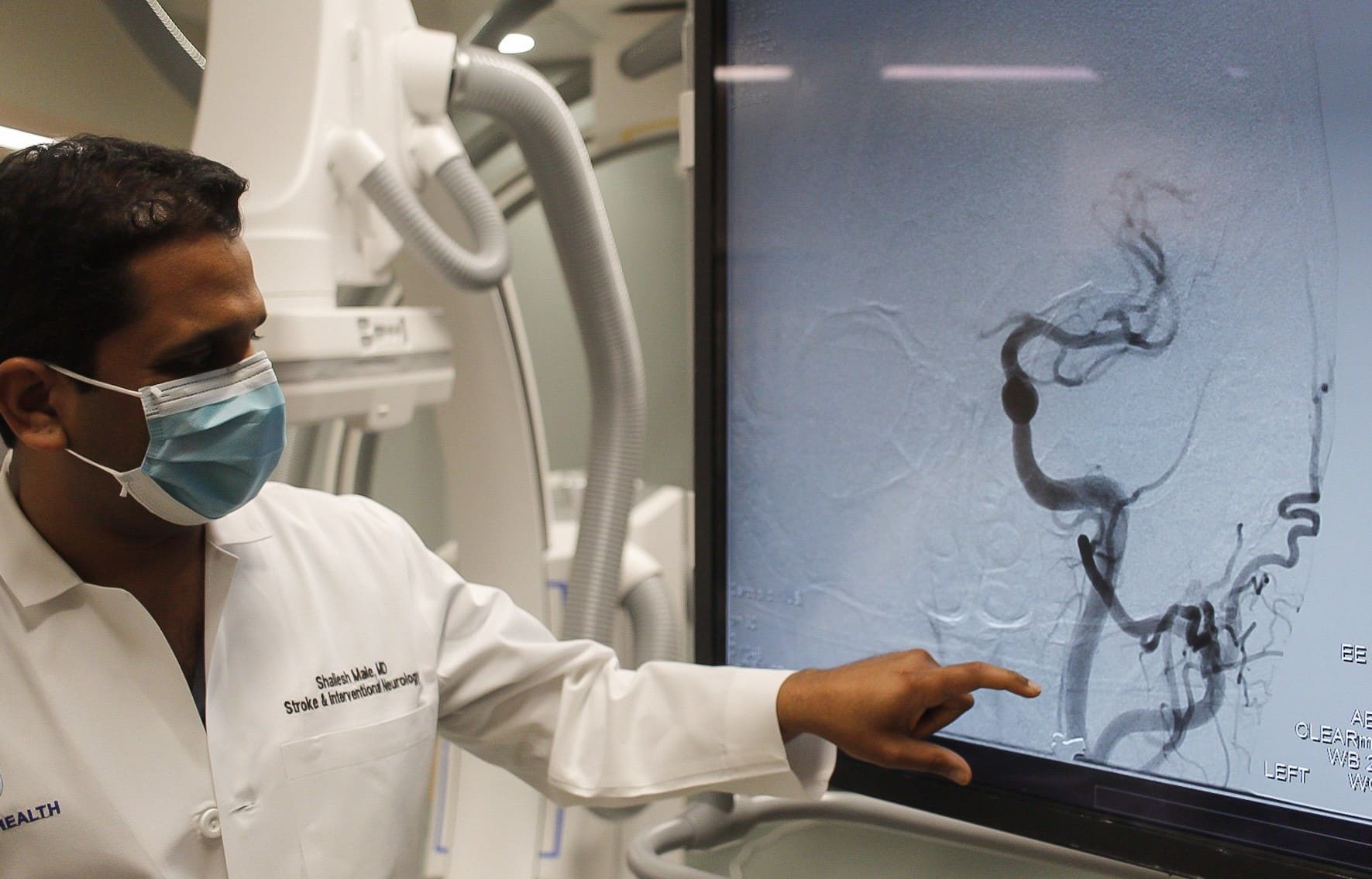
Risk factors for stroke can be broken down into two categories: modifiable and non-modifiable.
“We like to focus on the modifiable risk factors, the ones that you can change,” said Dr. Male. “These include hypertension, cholesterol, diabetes, smoking, physical inactivity and obesity.”
The increase in younger people having strokes are mostly attributed to modifiable risk factors. The rise in popularity of e-cigarettes and vaping has largely been in younger populations. Smoking reduces the amount of oxygen in the blood, makes the heart beat faster and raises blood pressure. Additionally, younger people are generally less healthy than previous generations in terms of diet and exercise.
“Processed, fatty and sugary foods are increasingly becoming a regular part of our diets at a younger age,” said Dr. Male. “This combined with an inactive lifestyle increases almost all risk factors including obesity, diabetes, high blood sugar, hypertension and high cholesterol.”
Non-modifiable risk factors include older age, gender (men face higher risk of stroke), family history, genetics and even race. According to The Office of Minority Health, African Americans are 50 percent more likely to have a stroke than non-Hispanic whites adult counterparts and 70 percent more likely to die from a stroke.
“African Americans have higher incidences of hypertension, diabetes and high cholesterol, which in combination, increases the risk of strokes,” said Dr. Male.
It is important to discuss risk factors with your primary care provider. If you have had a stroke, your doctor may prescribe preventative medications to address risk factors like blood thinners, cholesterol medication or blood pressure medication. Additionally, lifestyle changes such as exercising more and eating healthier foods are proven to lower your risk of stroke.
“With great treatment options now widely available, it is important to remember, time is of the essence,” said Dr. Male. “The sooner we implement treatment, the better the odds that the patient will recover to their baseline. The benefit of early treatment is preventing long-term disability.”
If a stroke is not caught quick enough, long-term disability and health issues are possible. Most commonly, patients may lose strength on one side of their body or have problems speaking.
The acronym B.E. F.A.S.T. can help quickly identify the signs and symptoms that you or a loved one may be experiencing a stroke:
- B – Balance problems
- E – Eye issues like blindness or seeing doubles
- F – Face drooping
- A – Arm weakness
- S – Speech slurring
- T – Time to call 911
 Greenville, N.C. – October 11, 2021– Vidant Health hospitals have received several American Heart Association/American Stroke Association Get With The Guidelines® achievement awards for their work in treating stroke, diabetes, cardiac arrest, heart attack, and heart failure.
Greenville, N.C. – October 11, 2021– Vidant Health hospitals have received several American Heart Association/American Stroke Association Get With The Guidelines® achievement awards for their work in treating stroke, diabetes, cardiac arrest, heart attack, and heart failure.
These awards recognize the hospital’s commitment to ensuring patients receive the most appropriate treatment according to nationally recognized, research-based guidelines based on the latest scientific evidence.
“Vidant’s recognition by Get With The Guidelines® demonstrates our commitment to quality care. Meeting our mission to improve the health and well-being of eastern North Carolina means finding solutions for chronic conditions that affect so many in our region, “ said Teresa Anderson, PhD, RN, NE-BC, senior vice president of quality at Vidant. “The Vidant system is proud to be recognized by the American Heart Association for turning guidelines into lifelines.”
Vidant Health hospitals receiving recognition include:
Vidant Beaufort Hospital, a campus of ECU Health Medical Center — Stroke Gold Plus and Target Type 2 Diabetes Honor Roll
Vidant Chowan Hospital — Stroke Gold Plus and Target Type 2 Diabetes Honor Roll
Vidant Duplin Hospital — Stroke Silver Plus and Target Type 2 Diabetes Honor Roll
Vidant Edgecombe Hospital — Stroke Gold Plus and Target Type 2 Diabetes Honor Roll
ECU Health Medical Center — Stroke Gold Plus and Target Stroke Elite Plus Honor Roll, Target Type 2 Diabetes Honor Roll, Mission: Lifeline Award: Gold Receiving, and Mission: Lifeline NSTEMI: Gold
Vidant North Hospital — Stroke Silver Plus and Target Type 2 Diabetes Honor Roll
Vidant Roanoke-Chowan Hospital — Stroke Gold Plus, Target Stroke Honor Roll and Target Type 2, and Diabetes Honor Roll
The Outer Banks Hospital — Stroke Gold Plus and Target Stroke Honor Roll Elite
“We are pleased to recognize Vidant Health for their commitment to diabetes, stroke and heart care,” said Lee H. Schwamm, M.D., national chairperson of the American Heart Association’s Quality Oversight Committee and executive vice chair of neurology, director of Acute Stroke Services, Massachusetts General Hospital, Boston, Massachusetts. “Research has shown that hospitals adhering to clinical measures through the Get With The Guidelines® quality improvement initiative can often see fewer readmissions and lower mortality rates.”
Stroke, diabetes and cardiovascular disease, which includes heart failure, heart attack and cardiac arrest, are among the leading causes of death in the nation. Cardiovascular disease claims more lives each year than all forms of cancer and chronic lower respiratory disease combined.
According to the American Heart Association/American Stroke Association, stroke is the No. 5 cause of death and a leading cause of adult disability in the United States. On average, someone in the United States suffers a stroke every 40 seconds and there are nearly 795,000 new or recurrent strokes each year. Stroke kills about 140,000 Americans each year, accounting for one out of every twenty deaths. In eastern North Carolina, the stroke death rate is even higher, highlighting the need for preventative and rapid care.
“These awards are another proud moment for the Vidant Health system as it earns the recognition from AHA/ASA for providing the highest level of stroke care through its network of acute stroke ready hospitals, primary stroke centers and a comprehensive stroke center,” said Dr. Shailesh Male, stroke medical director at VMC. “This honor is a testament towards Vidant’s commitment to improve the health and well-being of eastern North Carolina.”
To speak with a Vidant neurologist for non-emergency care, please call 252-816-9700.
To find a heart and vascular provider, please visit Vidanthealth.com/Find-A-Doctor
Dr. Dalyai joined WITN during Stroke Awareness Month in May to discuss stroke issues in the area.
“People here in North Carolina are so much more likely to have a stroke and to die from a stroke than elsewhere in the country,” Dr. Dalyai said, “and even more so in eastern North Carolina than other parts of North Carolina.”
There are many different factors that can lead to stroke, including hypertension, or high blood pressure, smoking and diets that are high in fat. There is also a genetic component and there is a racial disparity in that strokes are more common in African Americans.
To spot the signs of a stroke, it is important to remember the acronym B-E F-A-S-T.
B – Balance, watch for a loss of balance
E – Eyes, vision changes
F – Face drooping
A – Arm weakness
S – Speech difficulty
T – Time to call 911
Dr. Dalyai said there are a number of ways to prevent stroke, depending on your risk factors. He said talk with your primary care provider to determine your risk and what you can do to stay healthy.
“The biggest thing that we tell patients is that they really should work with their primary care provider to focus on their specific needs,” Dr. Dalyai said. “Whether it’s medications or diet, physical activity, all these things that are specific to you that you can do to reduce your risk of having a stroke.”
ECU Health Medical Center passes 2,000 Gamma Knife treatments
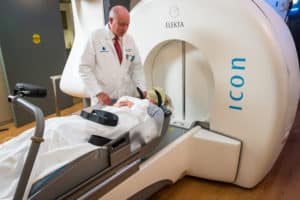
ECU Health Medical Center (VMC) was proud to recognize its 2,000th Gamma Knife treatment in April.
“I am incredibly proud of this important milestone in Vidant’s collective work to realize a life without cancer,” said Dr. Stuart Lee, chief, division of neurosurgery, Vidant Health and medical director of The Gamma Knife Center, VMC. “Our teams work passionately to support those battling cancer. Those across our region can access advanced technology close to home, which reduces the need to travel elsewhere to receive treatment. By performing 2,000 Gamma Knife® procedures, we are delivering on our mission to improve the health and well-being of eastern North Carolina.”
The Gamma Knife® at VMC is one of only two in North Carolina and the newest version, the Gamma Knife®ICON, was installed in 2018. The Gamma Knife® works by destroying cancer cells, which shrinks the size of brain tumors over time. This technology offers quick recovery time and can be done in an outpatient setting, preventing the need for hospitalization. Gamma Knife® also provides convenience by requiring minimal follow-up procedures, reducing barriers related to travel for the patient.
“On behalf of ECU Health Cancer Care, I want to express my sincere gratitude to Dr. Lee and his team,” said Chris Wood, senior administrator, ECU Health Cancer Care. “Nearly all of us are impacted in some way by cancer, whether it’s through our own personal experiences, or the experiences of a loved one. Dr. Lee and his team are an important part of how ECU Health Cancer Care provides for those we love and serve who are battling cancer.”
To learn more about the full spectrum of Neurological Care, including neurology and neurosurgery, visit VidantHealth.com.
 Roanoke Rapids, N.C. – July 15, 2021 – Vidant North Hospital is proud to announce it has been designated as a primary stroke center by The Joint Commission and the American Heart/Stroke Association, recognizing the hospital’s preparedness and expertise to care for stroke patients. Stroke is one of the leading causes of death in the state, resulting in more serious long-term disabilities than any other disease.
Roanoke Rapids, N.C. – July 15, 2021 – Vidant North Hospital is proud to announce it has been designated as a primary stroke center by The Joint Commission and the American Heart/Stroke Association, recognizing the hospital’s preparedness and expertise to care for stroke patients. Stroke is one of the leading causes of death in the state, resulting in more serious long-term disabilities than any other disease.
According to the North Carolina State Center for Health Statistics, both Halifax and Northampton counties show increase incidences of stroke disease and mortality compared to the North Carolina average. “Here in eastern North Carolina we are at the center of a lot of strokes. North Carolina is about 8 percent worse for stroke mortality than the rest of the nation and in eastern North Carolina it is even a bigger risk,” said Dr. Richard Dalyai, neurosurgeon and surgical director of stroke services at Vidant Health. “Providing high-quality stroke care close to home is central to our mission of improving the health and well-being of eastern North Carolina.”
As a primary stroke center, Vidant North can treat and stabilize patients experiencing an acute stroke and care for more complex patients. Because time is one of the most important factors in treating stroke, it is vitally important to provide stroke care close to home. Vidant North’s stroke certification increases proximity to quality care in the Roanoke Rapids area, which reduces the risk of mortality, permanent brain damage and other side effects including memory loss, difficulty speaking and potential paralysis.
During the certification process, Vidant North was evaluated on performance measures in stroke care, including education for patients and families on stroke risk factors and recognizing symptoms of stroke. Other performance measures included staff education on stroke protocols and the appropriate prescription of medications to address stroke risk factors such as elevated cholesterol.
“Stroke certification from The Joint Commission represents Vidant North Hospital’s commitment to provide high-quality stroke care to not only patients experiencing stroke symptoms, but to all of our patients,” said Jason Harrell, president of Vidant North. “We are proud of being designated a primary stroke center and the commitment and diligent work of our team members across all levels and services to make this a reality.”
“I am incredibly proud of this important milestone in Vidant’s collective work to realize a life without cancer,” said Dr. Stuart Lee, chief, division of neurosurgery, Vidant Health and medical director of The Gamma Knife Center, ECU Health Medical Center.
The Gamma Knife® works by targeting problematic cells, which shrinks the size of brain tumors over time. This technology shortens recovery time and is often performed in an outpatient setting. Before this technology, for certain kinds of brain tumors, the treatment was whole-brain radiation, which means even the healthy parts of the brain were radiated.
Dr. Lee spoke of a previous patient whose brain tumor shrunk significantly six weeks after treatment. “This was a lady in her late thirties who was still working, even with her cancer,” Lee said. “She actually went on a cruise after her second Gamma Knife®.”
“Our teams work passionately to support those battling cancer. Those across our region can access advanced technology close to home, which reduces the need to travel elsewhere to receive treatment,” said Dr. Lee. “By performing 2,000 Gamma Knife® procedures, we are delivering on our mission to improve the health and well-being of eastern North Carolina.”
